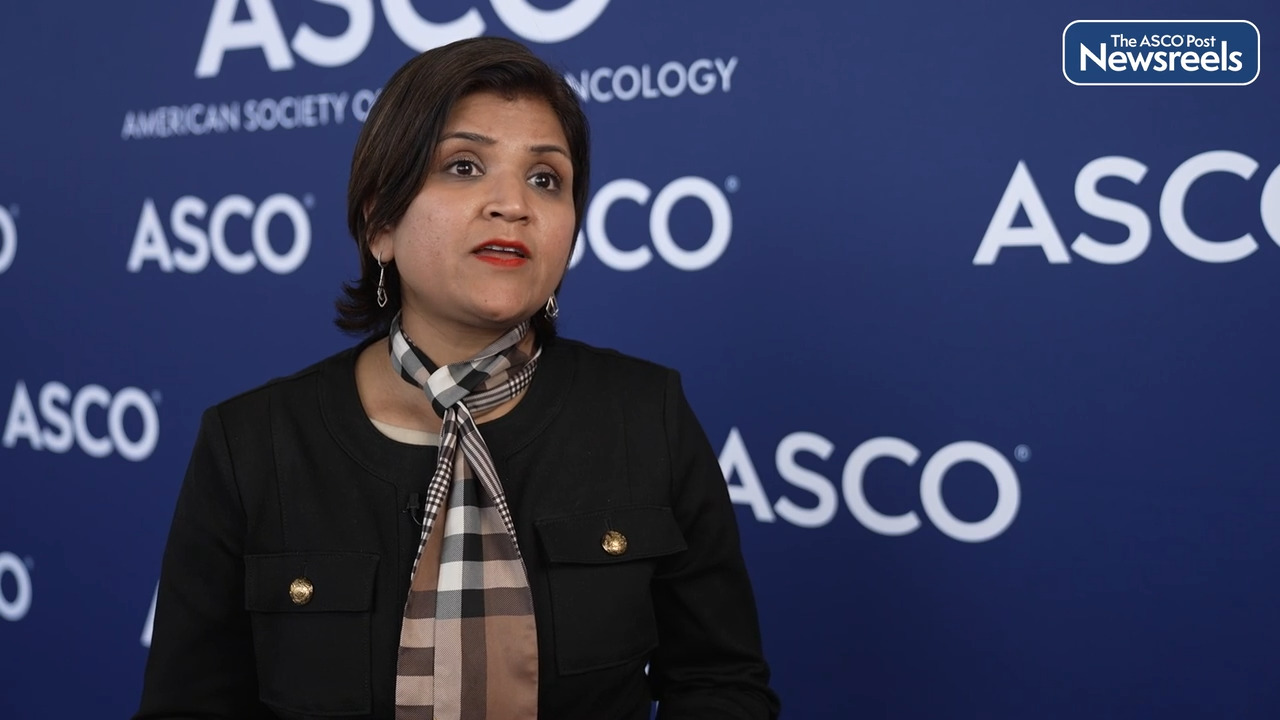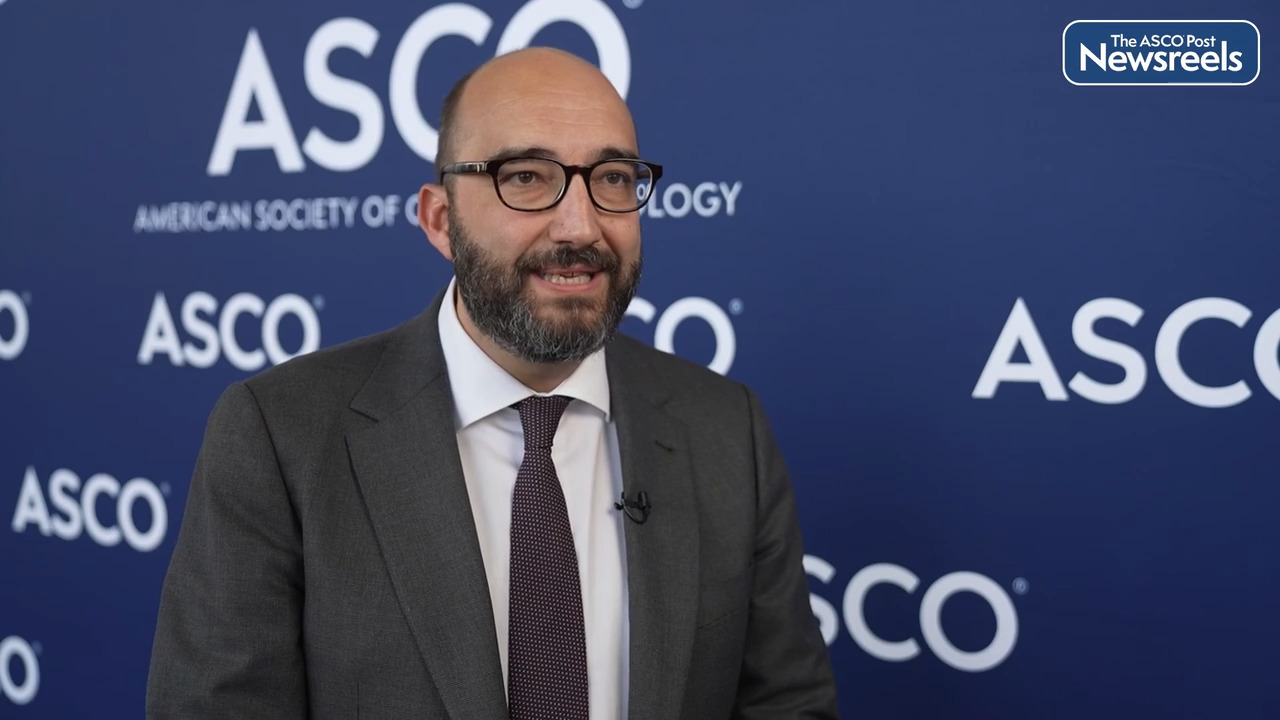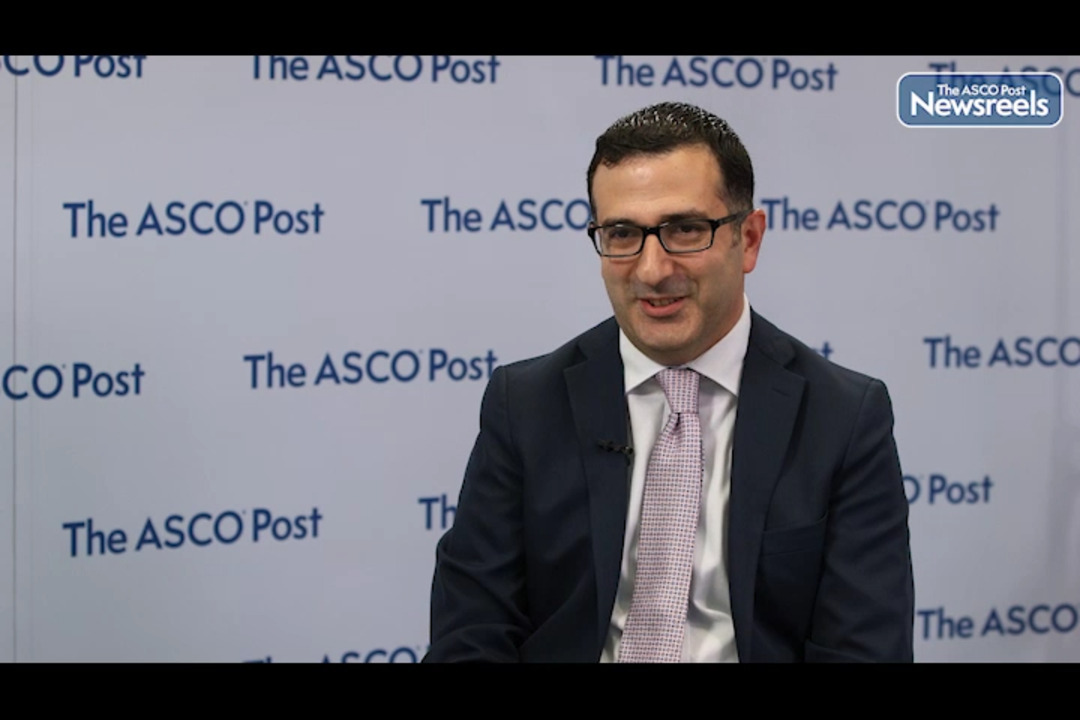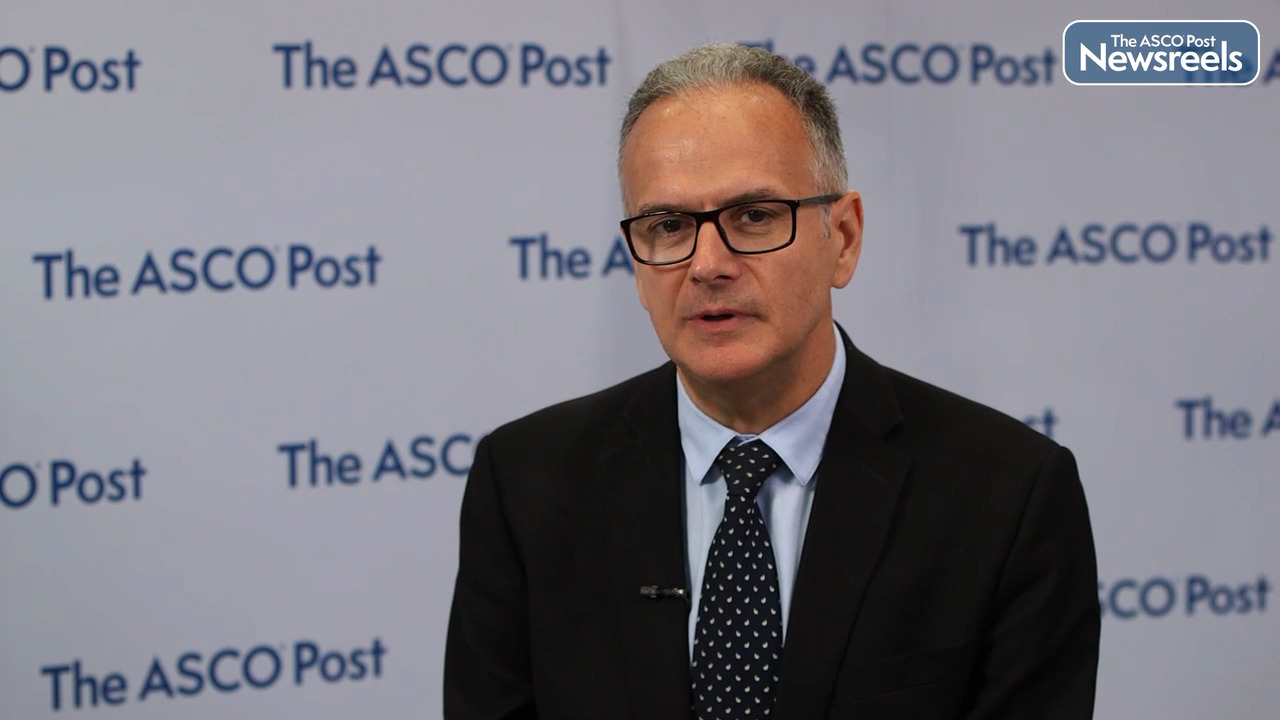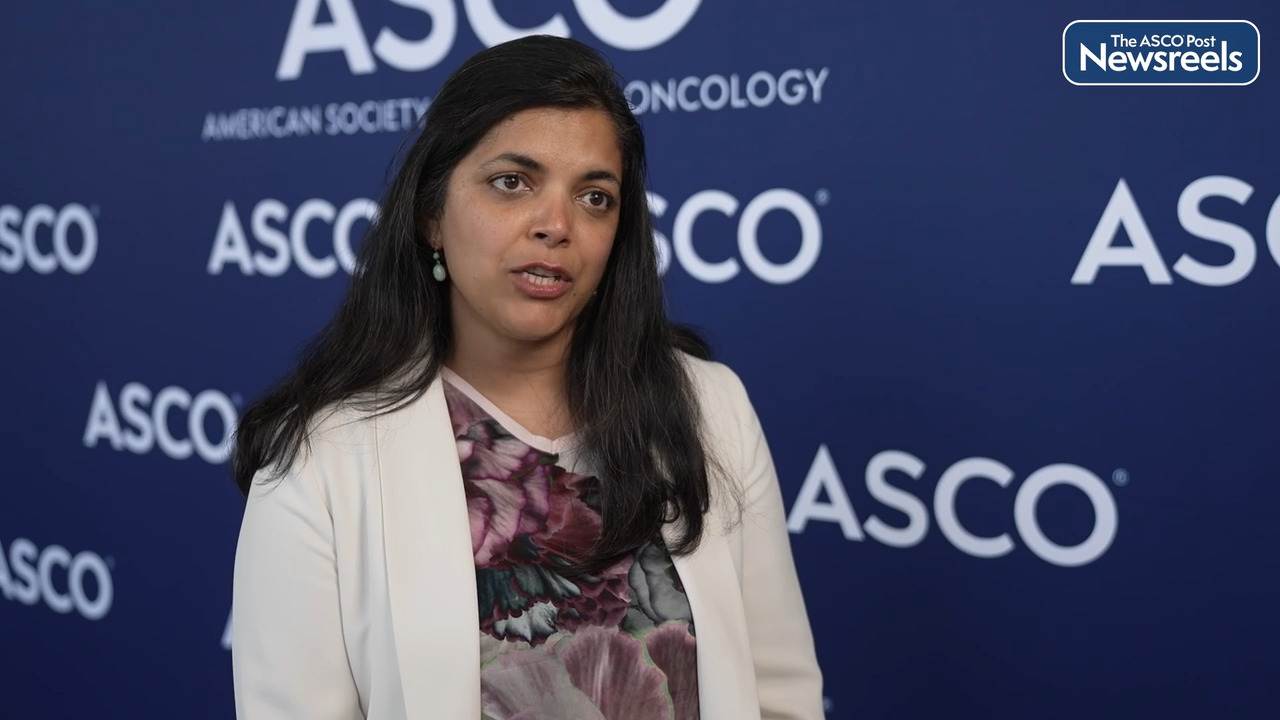Transcript
Disclaimer: This video transcript has not been proofread or edited and may contain errors.
Dr. Kathy Eng:
Welcome, Dr. Thejus Jayakrishnan. I was very interested in your presentation. Can you tell me a little bit more about why you're focused on the early onset patient population?
Dr. Thejus Jayakrishnan:
Yes.
Dr. Kathy Eng:
And tell me a little bit about what inspires you. I think I've heard some of your story, but I'd like to hear... I think our audience members would appreciate it, and give us a little bit of information about this early onset patient population.
Dr. Thejus Jayakrishnan:
Definitely. It's an honor to be here sitting with your daughter, Eng, and discussing my study. Yeah. I would say my inspiration are the patients that I've seen with early onset colorectal cancer, early onset GI cancers that I've seen in the clinic. During my residency, and even within my own family members, I've had individuals who have developed cancer early, and I could see how much their life was impacted afterwards. And they were not young like the patients that I'm seeing in the clinic now. I used to think 50 may be young, forties young. But I'm seeing patients who are in their thirties developing stage four cancer. And I can see how it impacts their life, the psychosocial aspects are very unique and different because they're building their family, they have a career, they're doing jobs. They do not know how to navigate those things.
So it's very, very difficult and different. And when you're seeing patients with stage four, it's difficult to even explain, how did someone who is carrying on their day-to-day activities without any other comorbidities, all of a sudden develop stage four cancer? And that was really what, when I started my fellowship, when I started seeing these patients, when I had the opportunity to discuss about areas to focus on, my mentor daughter, Ala Korana, Dr. Kormack, brought up this topic. And based on the experience, I thought that would be a great area to invest my time and energy in. So regarding the metabolomics, so my study was regarding metabolomics or metabolic differences between young onset and average onset colorectal cancer. Meaning patients who develop colorectal cancer at a young age compared to those who develop it later age.
Dr. Kathy Eng:
Can you define young-
Dr. Thejus Jayakrishnan:
Yes.
Dr. Kathy Eng:
For the audience?
Dr. Thejus Jayakrishnan:
Yes, absolutely. So for our research purposes, we defined young as individuals with age less than 50 years of age when their cancer is diagnosed.
Dr. Kathy Eng:
Okay. And is that a general term for most early onset studies?
Dr. Thejus Jayakrishnan:
Yes, I want to say. I think the terms young and early onset are used interchangeably, and I think the field is moving more towards using early onset, I think. In our abstract, in our study, we used young onset.
Dr. Kathy Eng:
Do you want to comment about, it's not just an issue in the United States, right?
Dr. Thejus Jayakrishnan:
Yes.
Dr. Kathy Eng:
It is a global concern.
Dr. Thejus Jayakrishnan:
Correct.
Dr. Kathy Eng:
Do you want to elaborate on that a little bit more?
Dr. Thejus Jayakrishnan:
Yes, it's happening globally, and there is also a birth cohort effect being noticed where individuals born a certain period of time are developing cancer early during their lifetime. But more importantly, and specifically to the United States, what we are seeing is, let's say a decade ago, the average age of onset of colorectal cancer was in the seventies, and now it's in the early sixties. I think mid-sixties, 66 is the median age of colorectal cancer. So there has been a shift in the median age of diagnosis of colorectal cancer. And what drove us to investigate this further is the fact that, our genetics may not change, it's unlikely to have changed that quickly in that period of time. And even if there are genetic differences between young and average onset, what are the reasons why that is happening? Why are those genetic differences happening in the first place?
Dr. Kathy Eng:
Sorry if I interrupt, but-
Dr. Thejus Jayakrishnan:
Yes.
Dr. Kathy Eng:
Do you want to discuss just a little bit for the audience? What do we know thus far about somatic mutations versus germline mutations? And some of the studies that have been conducted thus far and why you are making your study very unique in this setting.
Dr. Thejus Jayakrishnan:
Yes. So there have been some preliminary studies. Actually, there have been some large scale studies, including some of the studies that your own team have presented, that actually show that overall, genetic alterations are somewhat similar. But when you look at individual genes like KRAF mutations or BRAF, some of the specific mutations, there could be differences between young and average onset. And I don't recall exactly, but I believe even the prevalences of the MSI, high microsatellites instability is slightly different between young and average onset colorectal cancers. So there are genetic differences, but what is driving those differences?
Dr. Kathy Eng:
Right.
Dr. Thejus Jayakrishnan:
And to paraphrase, actually, I want to correct myself. Not the genetic difference, but the mutations that are different between young and average onset. What is driving those mutations? That is what we wanted to explore further. Are there environmental exposures such as diet or other chemical exposures that may have happened to individuals in the last 50 years that have been predisposing them to developing cancer more early?
Dr. Kathy Eng:
And metabolomics is defined as a general description involving?
Dr. Thejus Jayakrishnan:
Yes. So metabolomics is the study of small molecular metabolites. And traditionally, when you think about it, there are all these metabolites in our body, like the citric acid or arginine or aspartic acid, or the amino acid, carbohydrate, fatty acid, all the metabolism in our body results in the release of ischemics, which are the metabolites. And traditionally, when you think about it, you think about measuring these concentrations of these metabolites, like sugar, the glucose, measuring these concentrations in our body. But now with more advanced techniques involving computational biology and systems biology approach, and including using softwares that incorporate machine learning approaches, what we are able to do is, we can actually adjust for various factors. In our study, for instance, there were differences in comorbidities between young and average onset patients.
Dr. Kathy Eng:
Perfect, because I was going to ask you that next question. So your sample size wasn't a large sample size, if I recall.
Dr. Thejus Jayakrishnan:
Correct, yeah.
Dr. Kathy Eng:
But it was, in your younger patient population, they tended to have left-sided tumors, which I thought was really interesting because I always think for early on, so they're going to more likely have right-sided tumors. And I wasn't sure if MSI high patients were included in your analysis, and there was a lot of obesity as well.
Dr. Thejus Jayakrishnan:
Yeah, I'll answer those questions. So, yes. So the left-sided cancers were higher in the young ones at group. Having said that, it was a convenient sampling from our [inaudible 00:07:03] bio-bank. So it may not reflect the general epidemiology per se, but when we look at the general 10 at the population level, we do see more left-sided cancers in young onset colorectal cancer patients. And in our study, it was as high as 80% had left sided cancers. In terms of the MSI status, it was not something which we looked at the design state of the study. So we did not exclude those patients. And I am assuming the reason you brought it up was because of the underlying implications in terms of risk for developing cancer.
Dr. Kathy Eng:
Correct.
Dr. Thejus Jayakrishnan:
Yeah. So we did not exclude them at the study design per se, but when we look back at these patients, there was only one patient who was MSI high in the young onset group, only three patients in the average onset group. So it's unlikely to have influenced our results.
Dr. Kathy Eng:
That's good to know.
Dr. Thejus Jayakrishnan:
Yes, yes, definitely. But again, that doesn't reflect the general population as such, but at least it did not impact our analysis, the MSI high status.
Dr. Kathy Eng:
So your findings, once again for our listeners or viewers, is that there was an increased citric acid level as well as arginine levels, and mostly, if I'm correct, earlier stage, early onset, is that correct?
Dr. Thejus Jayakrishnan:
It is actually the average onset group. So when we compare the young versus average onset, so the different techniques that we use, one is looking at the differential abundance of metabolites. So looking at, is metabolites more abundant in one group versus the other? And the other part of the research is to look at how these altered metabolites involve different pathways and how those patterns altered compared to what we would expect in a person without cancer.
Dr. Kathy Eng:
I see.
Dr. Thejus Jayakrishnan:
And so, what we saw was the citrate level, which is a key metabolite involved in a TCA cycle, which is the metabolic cycle involving generating energy, is high in average onset patients, patients who develop cancer at later age. But in young onset patients, it is so relatively low, which may indicate more metabolic alterations or dysregulation. We also found that when you compare both these groups, and when comparing the altered metabolites involved in the pathways, a pathway called the arginine biosynthesis, which is involved in generating arginine, was significantly altered between the two groups. And in our study, we did not look at the actual enzyme activity to say, okay, is it actually increasing or not? But based on our metabolic concentration levels, what we are seeing is that it's different in both groups between young ones and an average onset, and the biosynthesis is altered in the young onset group. And the relevance of that is that, it has been shown that dietary factors such as red meat consumption affects our microbiome and can all affect the [inaudible 00:09:58] so that's relevant that way.
Dr. Kathy Eng:
I guess moving forward, our last question is, what do you envision to... How will you take the information you learned from this, to move it forward for additional research for the same patient population?
Dr. Thejus Jayakrishnan:
Definitely. So as I mentioned at the beginning, our goal here is to determine, how are different environment exposures affecting the patients developing cancer early? And is there a way we can detect that early? And the two ways to look at these metabolites is, is it related to our own metabolism? Or is it related to microorganisms that live in our gut, that are impacted by the dietary exposure such as red meat?
Dr. Kathy Eng:
Maybe related to both.
Dr. Thejus Jayakrishnan:
Related to both, yes, exactly. So our next step would be to correlate with these metabolic alterations with host metabolism, meaning our own body's metabolism versus the microbiome metabolism. One. Number two would be to see if we can utilize that to screen individuals who are at high risk for developing cancer once we identify those signals. But first, we'll have to validate the results in a larger population level. And then, as a next step, if we can identify these alterations, then we could develop therapies that could target these metabolic pathways.
Dr. Kathy Eng:
That would be great. Well, thank you so much for explaining your research, and I look forward to learning more, and I'm sure your career's going to continue to blossom, so thank you so much.
Dr. Thejus Jayakrishnan:
Thank you so much. Yes. I'm happy to discuss today. Thank you very much for the opportunity.
